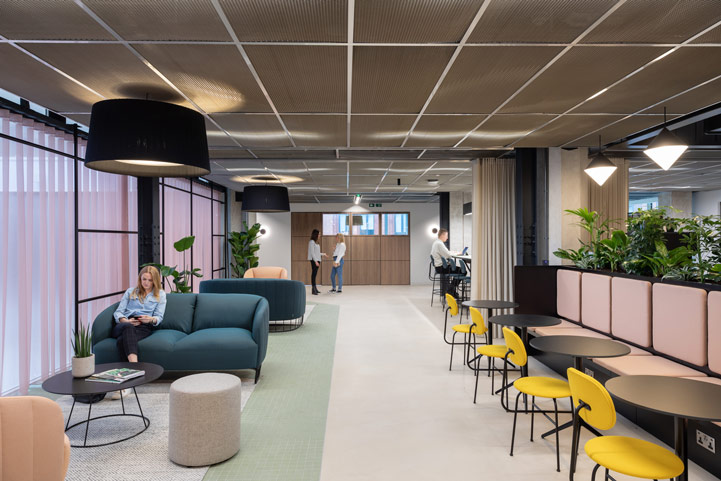What are landlords' views on the future of flexible office space?
Introduction
Welcome to Savills Landlord Flex Survey 2022.
The survey was undertaken in May 2022 and gauges the views and attitudes of landlords towards the flexible workspace sector. There were 28 responses to the survey from landlords who owned, in total, 143 million sq ft of space. The type of property owners varied from funds/asset managers, REITs, property companies and private landlords, providing different perspectives on the flexible workspace sector. We will compare our 2022 survey against our survey conducted in November 2020, to understand whether perspectives have changed over the last 18 months.
After reduced levels of take-up due to the lockdowns experienced in 2020 and early 2021, the demand for conventional office space recovered, with take-up across the regional office (including Greater London & South East) and Central London office markets in 2021 only 5% and 12% below the long-term average. The demand for flexible office space, however, returned quicker than anticipated in 2021, with an 83% increase in the number of enquiries for flexible workspace in 2021 when compared to 2019. The demand has derived from start-ups and larger occupiers that require over 50 desks and are seeking short-term flexible office space solutions whilst they assess their optimum spatial requirements. It is envisaged that the demand from larger occupiers will continue although there's a shortage of flexible office space, notably in city centres, that can accommodate these large requirements.
Leasing activity from flexible office operators experienced exponential growth in the UK prior to the pandemic, with take-up averaging 2.2 million sq ft between 2017–2019 in Central London. Take-up from operators has been gaining momentum gradually, and many operators are seeking new sites to expand in 2022 and beyond. The acceleration of demand for flexible office space, evidenced in the increase in enquiries, is expected to result in an uptick in leasing activity from flexible office operators that are predominantly seeking management agreements rather than conventional leases as we emerge out of the pandemic.
The flexible office market has strong fundamentals for growth, with £16.6 billion of venture capital (VC) raised across the UK in 2021, which was more than the previous ten years combined. There has been a further £13.9 billion of VC raised at the end of H1 2022, highlighting the strength of the start-up community in the UK. The technology sector has accounted for 42% of all VC raised since the start of 2021. According to Tech Nation 2022, there are just under five million people working in tech start-ups and scale-ups, which is an increase from the three million in 2019. The provision of flexible office space will help enable the expansion of start-ups across the UK.
The Landlord Survey Results
Future appetite
The survey uncovered that 22% of the landlords are either planning or would like to operate their own brand of flexible workspace. The current portfolio of the respondents who are planning to operate their own floor-space totals one million sq ft. The appetite from landlords to operate their own flexible workspace in the future has marginally fallen from 29% in the Workthere 2021 Landlord Flexible Survey, which was undertaken in November 2020.
This might be a result of landlords learning quite quickly that creating their own flex space is more than simply creating a fitted space, which was often the perception. Many have learnt the hard way that you need to provide a level of service to underwrite your product and retain customers. Several are now, therefore, looking to partner with operators for this expertise rather than undertake it themselves.

MYO by Landsec
Importance as part of the overall office offering
The sentiment from landlords towards flexible workspace remains positive, with 57% of respondents considering a flexible workspace operator as a tenant within their building as nice to have or important – this was marginally down from 62% in the 2021 survey.
The importance of flexible office space could be set to rise in future surveys due to the growing importance of affordable workspace. As part of the London Plan 2021, local authorities need to consider detailed affordable workspace policies in their development plans. The ESG credentials of a building can be enhanced by the inclusion of an affordable workspace operator. Low cost, flexible workspace can help drive innovation, job creation and provide the ecosystem for economic growth. This trend is not solely confined to London, with the availability of low-cost workspace in the regional market also growing in importance with the market experiencing strong rental growth.
Landlord attitudes towards flexible office space
The survey uncovered that 46% of respondents were optimistic on the future for the flexible office sector. Notably, the proportion of respondents pessimistic towards the sector was 8%, which is lower than the 17% in the 2021 survey. On balance, the sentiment towards flexible office space from landlords has improved, with 92% of respondents either optimistic or ‘undecided’, which can be viewed as neutral – this compared to 83% in the 2021 survey.
The fact that the sector has bounced back relatively quickly from the lows of 2020 and early 2021 has most likely resulted in the reduction in pessimism from landlords. According to Workthere’s 2022 Flexmark, occupancy across the sector is now back at pre-pandemic levels of 81%.
Flexibility of lease terms
The increase in the positive sentiment towards flexible office space from landlords may also be attributed to the increase in demand from both start-ups and larger occupiers. This is reflected in the below chart, with 72% of respondents expecting their tenants to require more flexibility and being able to book space on an as-needed basis.
The current provision of flexible office space is mainly geared toward catering for private offices rather than co-working spaces. If the trend of occupiers seeking this option continues to gather momentum, flexible office space operators may have to increase the proportion of space in their centres dedicated to co-working space.
There has been an emergence of new apps that can help facilitate the increased flexibility required by companies whereby they purchase credits for their employees to work across a variety of spaces that are available on the app. This market is likely to mature quickly as occupiers continue to diversify the type of space they occupy as businesses continue to review their working practices.
How much space for the flexible offering?
The survey revealed that 61% of respondents would be comfortable letting 10–25% of a hypothetical 50,000 sq ft building to a flexible office provider.
This proportion of the building let to a flexible office provider was the most popular quantum in the 2021 survey and increased from 50%, underlining the importance of incorporating flexible office space in a multi-let office building.
Management agreements
The majority of respondents were either neutral or open to considering a management agreement with a flexible office operator. The proportion of respondents that were open to a management agreement was 46%, which was an increase from 41% in the 2021 Survey.
It is expected that the proportion of landlords that are open to management agreements will increase in future surveys, with flexible office operators' willingness to commit to conventional leases falling. The mutual benefits for both the landlord and operators a management agreement can provide will prove attractive as the flexibility desired from tenants continues to increase. Furthermore, as we see more management agreements entered into, and subsequent trading of assets and hopefully more data around performance, we expect landlords will increasingly be more open to using them, especially where increased returns can be realised.

Storey by British Land
Key points
What are the top five takeaways from this survey?
- Sentiment from landlords towards flexible office space remains positive, with 92% of respondents either optimistic or neutral on the future of flexible office space.
- Flexibility will continue to increase in importance to occupiers, and 72% of landlords believe that occupiers will require more flexible lease terms and being able to book space on an as-needed basis. This trend could see an increase in the amount of co-working space that flexible space operators or landlords incorporate into their flexible office space portfolios.
- The importance of flexible office space in a multi-let building was highlighted with 61% of landlords being comfortable letting 10–25% of a hypothetical 50,000 sq ft building to a flexible office operator. This was the most popular quantum amongst landlords and increased from 50% in the Workthere 2021 Landlord Flexible Office Survey.
It's expected that going forward, multi-let buildings over 50,000 sq ft will provide flexible office space as the occupier demand for this type of space continues to rise. - The appetite from landlords to create their own flexible office space has fallen from the 2021 survey, with 22% of respondents planning or would like operate their own flexible office space – this was previously 29%.
- In the short term, we expect management agreements to become more common between landlords and operators. The proportion of the landlords that would be open to considering a management agreement with a flexible office operator was 46%, which was an increase from the 2021 survey, where 41% were open to a management agreement.
Operators are predominantly seeking management agreements rather than conventional leases as we emerge from the pandemic. The expertise that operators can provide will prove attractive to landlords that are seeking to benefit from the increased demand for flexible office space.
FURTHER INFORMATION
